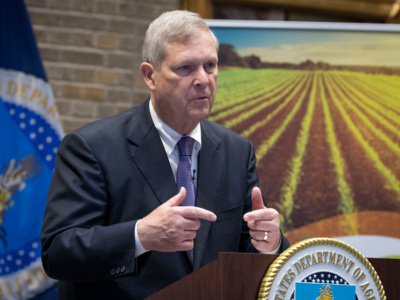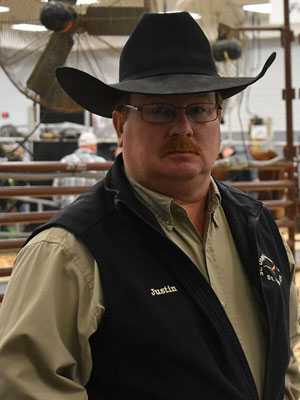Secretary of Agriculture Tom Vilsack does not see USDA’s proposal to clarify a “Product of USA” voluntary label for meat, poultry and eggs as a step toward returning to a mandatory country-of-origin labeling. Instead, the nation's top ag official believes the voluntary approach will prevent U.S. agricultural producers from retaliation.
Vilsack on Monday rolled out a proposal to tighten requirements on “Product of USA” labels placed on beef, pork, poultry and egg products throughout U.S. grocery stores. Under current law, foreign-sourced product can bear the “Product of USA” label if it is processed or repackaged in American facilities, but USDA is proposing to limit the labels only to meat from animals raised, slaughtered and processed in the U.S.
Speaking to reporters Monday at the National Farmers Union convention, Vilsack said the proposed rule is intended to ensure product specifications meet the demands of consumers.
“I think it’s important for us to make sure that if people are trying to get market value or market advantage by virtue of what they’re displaying to the consumer, that they can back it up,” Vilsack said. “If they can’t, then they shouldn’t be allowed to misrepresent the nature of their product and put those farmers and those producers and processors who are playing by the rules at a disadvantage.”
The return of “born, raised and slaughtered” terminology could be seen as a hallmark of the days of mandatory country-of-origin labeling and the hotly contested debates the issue generated in American farm groups and global trade courts.
For decades, certain segments of cattle producers have fought for additional labeling claims to differentiate their products that are born, raised and slaughtered in the United States. Congress first approved mandatory COOL in 2002, but most packages didn’t carry a label until 2009 after delays were urged by meat processors.
 Ag Secretary Tom Vilsack
Ag Secretary Tom Vilsack
Canada and Mexico successfully challenged the law at the World Trade Organization and forced Congress’ hand to eventually repeal it in 2015 after the WTO approved $1 billion in retaliatory tariffs on U.S. goods ranging from meat to wine, chocolate, jewelry and furniture.
The North American Meat Institute — the trade association representing companies that process 95% of the nation's beef, pork and veal — noted since the WTO authorized Canada and Mexico to retaliate in 2015, those retaliatory tariffs can be activated again “without any further action by the WTO.”
“Although the proposed ‘Product of the USA’ policy is voluntary, it would require meatpackers and processors who wish to make the claim to segregate cattle, hogs and meat from other nations," NAMI said in a Frequently Asked Questions document on the proposed rule. "This segregation was the basis for the WTO finding and is what allows Canada and Mexico to levy tariffs on American goods.”
A joint statement from Canada’s Minister of Agriculture and Agri-Food Marie-Claude Bibeau and Minister of International Trade, Export Promotion, Small Business and Economic Development Mary Ng said Canada “remains concerned about any measures that may cause disruptions to the integrated North American livestock supply chains.”
The Canadian officials’ statement also said they will “firmly oppose any proposition from the United States to renew a mandatory country-of-origin labeling system for pork and beef” since the WTO already approved retaliatory measures for previous proposals.
Chris White, president and CEO of the Canadian Meat Council, believes the 60-day comment period will allow Canada to better understand the implications of the rule, especially its impact on Canadian jobs and producers and whether it violates the terms of the U.S.-Mexico-Canada-Agreement. “We're cautiously optimistic that it won't be too dire,” he told Agri-Pulse.
“We’re going to be obviously quite engaged in the process with our officials,” White added. “I don’t think anyone is obviously setting out to do harm, and if there’s harm that could potentially happen, our sense from our officials has always been that American officials are always open to having that conversation and to better understand the nuances or perspectives or issues that they hadn’t fully appreciated."
NAMI issued statements that indicated a higher level of concern. The group, which was among those opposed to the COOL language repealed in 2015, argued USDA's Monday proposal “would be broader than mandatory COOL because it also includes processed products and products for food service, which were not subject to mandatory COOL.” These products “include certain brands of popular American foods like hot dogs, sausage, bacon, ground beef, sliced ham, spareribs, veal chops, boneless hams, steaks, burger patties and pepperoni.”
Justin Tupper, a South Dakota cattle producer and president of the U.S. Cattlemen’s Association, said this action fills a regulatory gap that allowed imported meat to be essentially repackaged and carry the “Product of USA” label, but does not carry the same weight as language previously struck down by the WTO.
 Justin Tupper, USCA
Justin Tupper, USCA
“I don’t think this infringes at all on our partners to the north,” Tupper said. “I think all it does is close a loophole of some of these companies trying to use our good name as the United States cattle producer and labeling some of this stuff that is not from here with our name and our good reputation.”
He said Canada’s food safety requirements match or exceed the United States; however, Brazil continues to be a “bad actor” on food safety and slow reporting of bovine spongiform encephalopathy cases. “We should make this a food safety and consumer issue, not just a producer issue,” Tupper said.
Don’t miss a beat! It’s easy to sign up for a FREE month of Agri-Pulse news! For the latest on what’s happening in Washington, D.C. and around the country in agriculture, just click here.
Tupper added USCA understands the implications of the WTO ruling and the need to make adjustments. “We can’t go back to exactly what we had. There has to be some changes.” This will require working alongside Canada and determining a workable solution, including a possible North American label.
“We’re going to have to sit down at the table and figure out what those changes are and see if there’s something that we can make happen there. And I think that would definitely involve our Canadian partners sitting down at the table to figure that out,” Tupper said.
White said a North American label would require a substantial amount of work between the three countries. “I think part of the whole premise of USMCA is predicated on making the flow of goods as easy as possible, and are there ways to improve that? Perhaps labeling is one, but that would be something that would have to be done at a trilateral level,” he said.
As for Vilsack, he still carries the bruises of the COOL WTO battles that occurred during his days as the Obama administration's ag secretary. Now, after years of debate and legislative alternatives, he says he still hasn’t seen a path that allows for mandatory COOL without triggering the retaliatory authority still held by Canada and Mexico.
“I think some people believe that there’s a roadmap to weaving the difficulties of getting a mandatory COOL piece of legislation or rule through the process. … We tried three times during the Obama administration, and we got beat back all three times. And that results in retaliation against other producers,” Vilsack said.
“I haven't yet seen the roadmap that gets us there, so in the meantime, what we can do is what we're already doing,” he added, referring to the “Product of USA” proposal.
For more news, visit www.Agri-Pulse.com.


